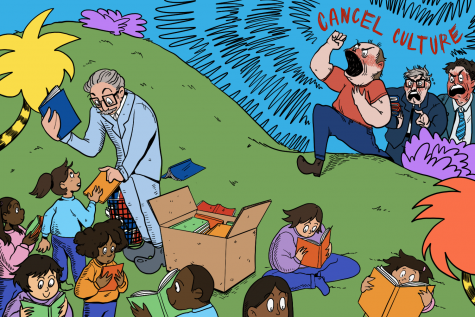Opinion: Oh, the thinks you can think when everything is ‘cancel culture’
March 10, 2021

Contrary to popular belief, news articles go beyond their headlines. The best way to prevent having green egg on your face is learning to read deeper and exercising media literacy.
Despite the many lessons Dr. Seuss imparted in his children’s books, “I Can Read With My Eyes Shut” was the only one taken at face value by fans who took to Twitter, TV and the Senate floor in false outrage over the beloved author being “canceled.”
Dr. Seuss Enterprises announced March 2 it would cease the licensing and publication of six books due to their “hurtful and wrong” portrayal of people, according to its website. While the estate claims to have done this to be more inclusive, conservative media would have you believe Dr. Seuss has been canceled.
Conservative personalities such as online political commentator Ben Shapiro, Fox News television host Tucker Carlson and practically the entire guest list at the Conservative Political Action Conference, an annual event attended by conservative activists and elected officials, salivated at the opportunity to bust a gasket at the imaginary scenario of there being a culture war to blame for children’s cartoons and toys no longer being distributed.
This change is not a malicious attempt to ruin your favorite thing—it is emblematic of businesses across the country taking it upon themselves to be more inclusive and more marketable to a wider audience.
Is it performative? Yes. Will it end racism and sexism? No. But it means a lot to kids interacting with this media.
While Teresa Prados-Torreira, professor in the Humanities, History and Social Sciences Department, is not usually in favor of censorship, she said the enterprise’s decision makes sense because Dr. Seuss’ depictions of Black and Asian characters are troubling for children who are not taught the historical context of the caricatures.
“What is the point of using books that are reflecting [children] in a negative, racist way?” Prados-Torreira said. “I cannot justify that in the name of free speech.”
Prados-Torreira said representation in popular culture can have a harmful impact on children. Although in real life Dr. Seuss defended the integration of Black people into the workforce during World War II, she said his negative portrayal of Asian Americans in his war cartoons following Pearl Harbor seemed to validate their treatment in internment camps during the war.
There are other characters that have been reimagined without being “canceled,” such as Mr. Potato Head being changed to Potato Head, which is simply an inclusive rebranding from Hasbro. Lola Bunny’s design was altered to minimize her sexualization in the upcoming Looney Tunes film “Space Jam 2” even though people are still sour about the change.
The contagious reaction to label progressive change as cancel culture has proven that influential people with a platform do not display the same amount of passion when it comes to discussing pressing issues, and their audience is too eager to take what they say at face value instead of doing their own research.
Outrage is a valid emotional response when you feel disrespected. Although I do not understand the deep-seated emotional response to C-tier Dr. Seuss books, a customizable potato, or those “simping” for an anthropomorphic bunny girl, I do understand the outrage of being disrespected when something I value has been demeaned.
I use my platform to express my outrage on important issues such as Black Lives Mattering, LGBTQ+ equality and Mirko from “My Hero Academia” being “best girl,” or a favorite character in an anime.
There is nothing wrong with commiserating with people over a shared grievance no matter how inconsequential it is. But let’s say, hypothetically, when the next bare-minimum inclusive shift in pop culture happens, we do not become the fanboy who cried cancel culture.







